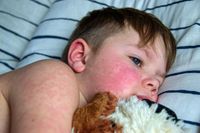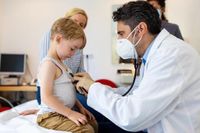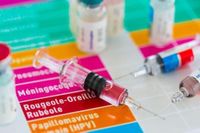As the flu epidemic begins to wane, health officials are sounding alarms over the rising threat of measles, a highly contagious viral disease. On March 20, 2025, Santé publique France (SPF) issued a warning about a concerning increase in measles cases across the country and throughout Europe, highlighting the need for vigilant monitoring and preventative measures. This alerts follows a preliminary notice issued to healthcare and early childhood professionals on March 7, 2025. Traditionally considered a mild childhood illness, measles is characterized by fever, fatigue, and distinctive rashes, yet its complications can lead to severe outcomes including hospitalization and even death.
The data released by SPF suggests that between January 1 and March 14, 2025, there have been 180 reported cases of measles in France, a significant increase from just 83 cases during the same period in 2024, effectively doubling the incidence. This resurgence is not confined to a single area but has affected 34 departments nationally, with the most pronounced occurrences observed in regions such as the North, Val-d’Oise, and Bouches-du-Rhône.
Worryingly, nearly half of those diagnosed with the virus have required hospitalization, with one especially grave case of encephalitis recorded. Young children are particularly vulnerable, with those under the age of four representing over a third of the reported cases. In fact, 35% of the cases involve children aged 1-4 years, while infants under one year account for 14% of the cases. Health authorities emphasize that the root of this outbreak is closely tied to vaccination rates, with SPF reporting that an alarming 70.5% of cases occurred in individuals who were unvaccinated or had an incomplete vaccination history.
This uptick in measles cases aligns with a larger trend observed globally, as public health officials note a concerning increase in measles incidences, particularly following a dip in vaccination coverage during the COVID-19 pandemic. Globally, the World Health Organization (WHO) and UNICEF noted 359,521 measles cases reported in 2024, which is a stark rise from previous years, with nearly 40 fatalities attributed to the illness in Europe during the same period.
In France, the consequences of this resurgence are significant. While 70.5% of reported cases involved people who were either unvaccinated or not up-to-date on their vaccinations, it becomes crucial to understand that nearly a quarter of the cases (23%) have been connected directly or indirectly to international travel, particularly to Morocco. This has prompted health agencies to issue advisories urging travelers returning from Morocco to verify their vaccination status and ensure they are protected against measles, amid rising concerns about outbreaks attributed to a notable increase in misinformation regarding vaccine safety.
SPF has emphasized the importance of timely reporting to regional health agencies (ARS), which is essential for identifying clusters of cases and implementing effective outbreak control measures. This is particularly critical as the spring season approaches, a time traditionally associated with increased disease transmission. Experts continue to advocate for heightened vaccination efforts, particularly among those groups less likely to be vaccinated, including young children and certain populations with limited access to healthcare.
The risk of severe complications from measles is not limited to children. Recent data has shown that young adults aged 30-39 are also increasingly affected, representing 14% of the total cases. In order to combat the rising tide of illness, health officials are urging the public to view every interaction with a healthcare professional as an opportunity to confirm vaccination status.
As vaccination campaigns ramp up, Santé publique France has reiterated the importance of the Measles-Mumps-Rubella (MMR) vaccine, which is now mandatory for all children born since January 1, 2018. Children must receive two doses of the MMR vaccine: the first dose at 12 months and a second between 16 and 18 months. For infants who received their first dose before 12 months, additional doses during adolescence or adulthood are recommended to complete their vaccination schedule.
In conclusion, the rising measles cases necessitate immediate action from health authorities and the public alike. The interconnectedness of vaccination status, international travel, and misinformation underscores a pressing public health challenge that must be addressed to protect vulnerable populations and prevent further outbreaks.




